Electric vehicles (EVs) are getting more popular in the United Kingdom. Many of us want to switch to a greener way to travel. To go along with this, I looked into how much it costs to install a charging point. This includes the electric car charger installation cost and the overall cost of the charging infrastructure for EV owners. The price to set up an EV charger can vary a lot. So, we need to really understand the costs of setting up a charging station. This is true whether you’re thinking about adding a charging point at home or the cost for businesses to do it. Knowing these costs helps us make a wise choice.
The cost of getting an electric vehicle charging point is now a big topic among drivers who care about the environment. I’ve looked into all parts of these costs. This includes the cost of the equipment and the work needed to get a charging station ready at your place. Stay with me as I go through the costs connected to using electric cars in the UK.
Key Takeaways
- Significant factors contributing to the overall EV charging infrastructure expenses in the UK
- Average EV charger setup price ranges and what they entail
- Differences in charging point fitting charges and their influence on total installation cost
- Available government grants to reduce the outlay on electric vehicle charging point installation
- Long-term financial benefits of investing in personal EV charging stations
Average Costs of Electric Vehicle Charging Points in the UK
When you think about getting an electric vehicle, you must think about charging it. In the UK, many things affect how much charging point installation costs. These include the cost to buy and install, the type of charger, and how fast it charges. All these affect the total cost.
Initial Purchase and Installation Expenses
Starting with electric vehicles needs a big first payment. On average, setting up a charging point costs £800 to £1,200. This includes buying the charger for about £1,000 and paying for someone to install it.
Some people choose to get their charger installed by the place they bought it from. This gives a standard price across the UK. But, some might save money by using an independent electrician. It’s important they know how to install EV chargers well.
The Impact of Charger Type and Speed on Total Cost
Different chargers offer different features and costs. You can find chargers with speeds like 3.6 kW, 7 kW, and 22 kW. Fast chargers charge your car quicker but cost more. For example, a 7 kW charger costs about £1,000 to install. A 3.6 kW one costs around £800. This shows how type and speed affect your money.
Comparing Tethered vs. Untethered Chargers
Choosing a charger means deciding if you want a tethered or untethered one. Tethered chargers, with a fixed cable, cost about £20 more than untethered ones. Untethered chargers don’t have a fixed cable.
Untethered chargers, although not as handy, let you do more. They can have things like locks or PINs to stop theft. I made a cost comparison to show the differences between these chargers:
| Charger Type | Cost without Installation | Cost with Standard Installation | Security Features |
|---|---|---|---|
| Tethered Chargers | £980 | £1,000 – £1,220 | Built-in Cable |
| Untethered Chargers | £960 | £980 – £1,200 | Detachable with Optional Lock & PIN |
I want to help you understand these details. This way, you can make a good choice when setting up a charging point at home or work.
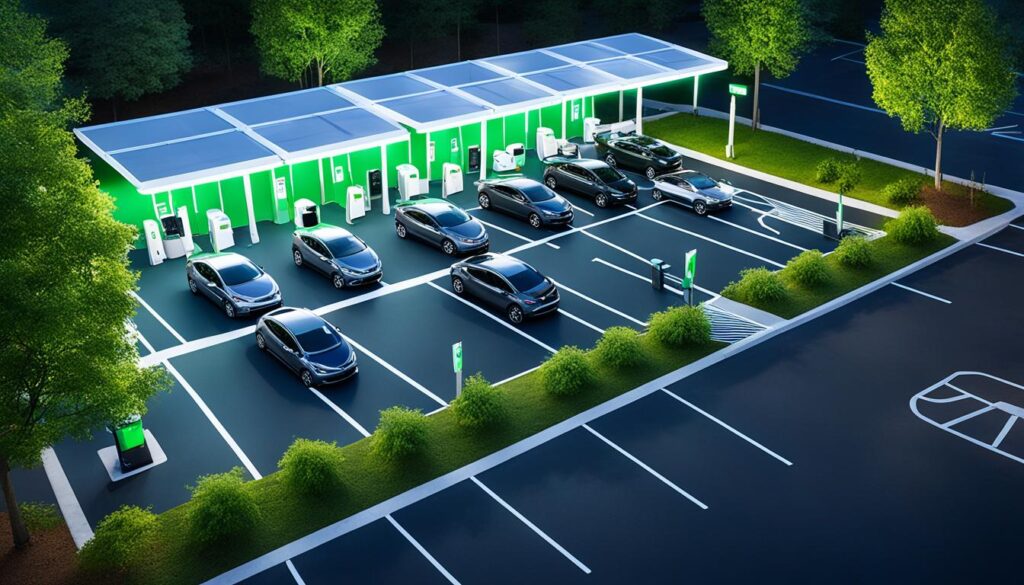
The Factors Influencing Charging Point Fitting Charges
Installing an electric vehicle charging point involves many elements. These elements greatly affect the cost. My home’s unique features and new tech changes are key. We need to look closely at each part to understand the costs better.
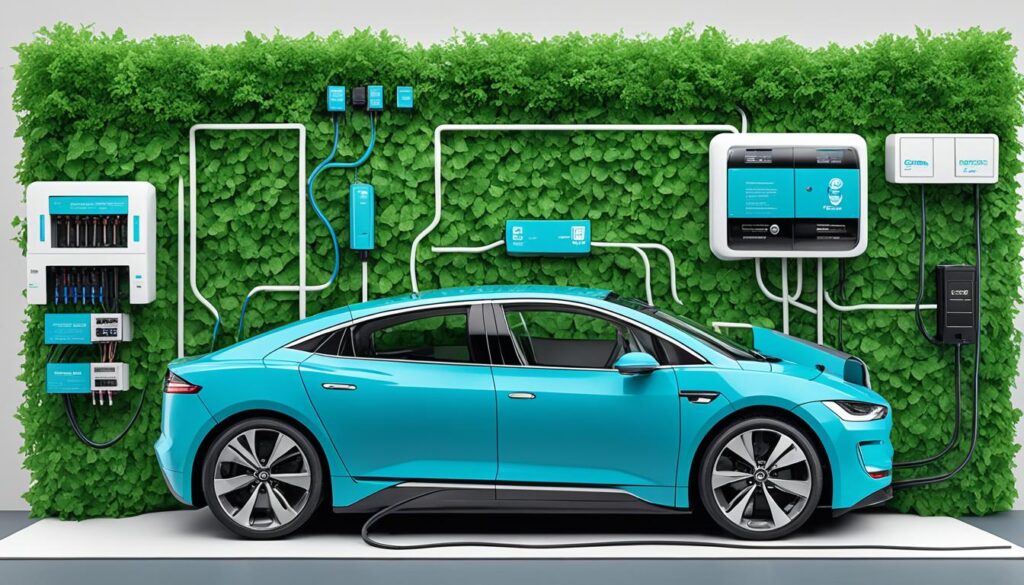
Installation Complexity and Property Specifics
Complex homes and far charging points raise costs. Extra wiring or drilling through stone adds more. It’s not just adding a device. It’s fitting it into the home’s very nature.
Evolution of Smart Features and Their Pricing
Smart features in charging systems also affect prices. Features like load balancing or app connectivity cost more. These features are an investment. They improve efficiency and remote control for users.
Brand Recognition and Associated Costs
Brand reputation also influences costs. Famous brands may cost more but offer more, like longer warranties or better service. This extra cost means quality assurance. It’s vital to weigh this against other expenses.
These factors together form a complex cost picture. Property detail, tech progress, and brand power all shape fitting charges. Understanding this landscape is key for future EV owners.
Charging Point Installation Cost: Savings and Government Grants
Getting a charging point can seem expensive at first. But, you save a lot over time. This is because charging at home is cheaper than using public stations. You could save about £467 every year.
Charging at home doesn’t just save money. It also means you can charge your car overnight. This can make your electricity bill cheaper too.
The government can help pay for your charger with the Electric Vehicle Homecharge Scheme. This can cut the cost by up to 75%, up to £350. The scheme helps more people choose electric cars. It also helps our planet by reducing pollution.
| Charging Cost Factor | Without Home Charging Point | With Home Charging Point |
|---|---|---|
| Annual Running Cost | Higher due to public charging station rates | Reduced by utilising home electricity |
| Convenience | Dependent on station availability | Charge anytime at home |
| Off-Peak Charging | Not always possible | Charge during lowest tariff times |
| Government Grants | No benefit | Up to £350 reduction via EVHS |
When thinking about getting a home charger, remember the savings and government help. Both make it a good choice for saving money and helping the planet.
Conclusion
Let’s sum up the charging point installation cost in the UK. Potential buyers should think about all the different costs. The usual cost to buy and set up an EV charging point is between £800 to £1,200. Yet, this basic figure can change based on several things that affect the total cost.
It’s important to remember several things can raise the charging point installation cost. These include how complex the setup is and the specific features of your property. The growth of smart technology and the attraction to certain brands also matter. But, government grants like the Electric Vehicle Homecharge Scheme (EVHS) can help lower these costs.
Putting money into a home charging setup brings immediate perks. These include easy access to charging and lower costs. Over time, it saves you money. My goal was to give you thorough knowledge. I wanted to help you make smart choices for your electric vehicle’s charging needs.





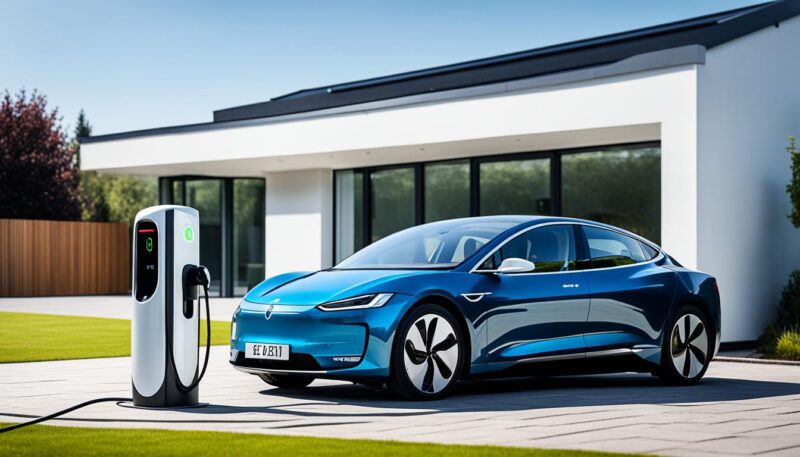


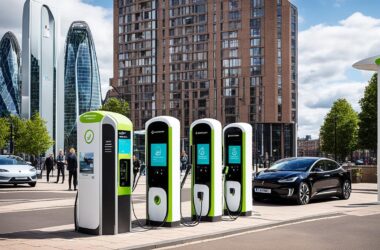
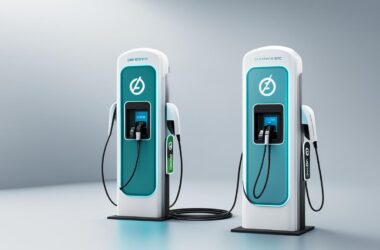

obviously like your web site however you need to test the spelling on several of your posts. Many of them are rife with spelling issues and I in finding it very troublesome to inform the truth on the other hand I will certainly come again again.
Great post, you have pointed out some great points, I too conceive this s a very superb website.
I truly appreciate this post. I’ve been looking everywhere for this! Thank goodness I found it on Bing. You have made my day! Thank you again
I savour, cause I found just what I was having a look for. You’ve ended my four day long hunt! God Bless you man. Have a great day. Bye